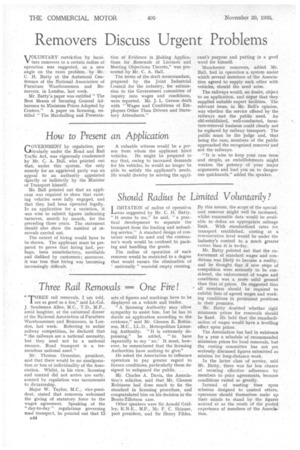Removers Discuss Urgent Problems
Page 58

If you've noticed an error in this article please click here to report it so we can fix it.
VVOLUNTARY restriction by furniture removers to a certain radius of operation was suggested, as a new angle on the rates problem, by Mr. C. H. Batty at the Autumnal Conference of the National Association of Furniture Warehousemen and Removers, in London, last week.
Mr. Batty's paper was entitled " The Best Means of Securing General Adherence to Minimum Prices Adopted by Centres." A paper on licensing, entitled " The Marshalling and Presenta
tion of Evidence in Making Applications for Renewals of Licences and Meeting Objections Thereto," was presented by Mr. C. A. Ball.
The terms of the draft memorandum, prepared by the Joint Industrial Council for the industry, for submission to the Government committee of inquiry into wages and conditions, were reported. Mr. J. L. Gerson dealt with " Wages and Conditions of Employees Other Than Drivers and Statutory Attendants." cant's purpose and putting in a good word for himself.
Manchester removers, added Mr. Ball, had in operation a. system under which several members of the Association agreed to supply each other with vehicles, -should the need arise.
The railways would, no doubt, object to .an application, and argue that they supplied suitable expert facilities. The relevant issue, in Mr. Ball's opinion, was whether the service offered by the railways met the public need. An old-established, well-conducted, furniture-removal business could clearly not be replaced by railway transport. The public must be the judge and, that being the case, members of the public approached the recognized remover and not the railways.
"It is wise to keep your case terse and simple, as embellishments might weaken the potency of your major arguments and lead you on to dangerous quicksands," added the speaker.




























































































